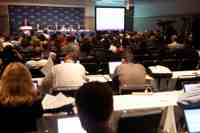By Jyoti D. Patel, MD
With the Annual Meeting less than one month away, I am certainly excited to attend the world’s largest cancer meeting. Every year I look forward to this event, and I am sure you do too. There’s a palpable energy to being in the midst of the McCormick Place lobby with thousands of other attendees, truly diverse people from all corners of the globe, bustling between sessions. For four days, our worldwide oncology community, even in this digital age of ultimate connectedness of social media, stops and comes together in Chicago to share what we have learned and accomplished over the previous year.
As an active member of ASCO’s Cancer Communications Committee, I have had a sneak preview of this year’s meeting. Our preparations began in March when the Annual Meeting News Planning Team met to plan ASCO’s official press program. We reviewed nearly 5,000 abstracts that were as diverse and interesting as ASCO’s membership. They included promising pre-clinical analyses, epidemiologic findings, survivorship studies, quality-of-life reports, and late-breaking clinical trial results. We were charged with selecting the most newsworthy abstracts—less than 1% of all abstracts —with the intention of highlighting the latest practice-changing advances and the impact they will have on patients’ lives. Those selected range in topics from early clinical developments to late-stage trials that will lead to new regulatory approvals imminently.
Although we picked less than 25 studies, most of the 99.5% of abstracts that weren’t selected are each newsworthy in their own right. This will be an excellent meeting with much news to share, not just with each other, but with the world. Cancer is a global problem—millions are affected worldwide every year. In the United States, cancer affects one in three women and one in two men with far reaching consequences that are both biological and psychological. Moreover, tremendous amounts of time, energy, and money, from diverse and often opposing sources, are expended upon expanding our understanding of cancer, rooted in the common goal of improving patient care. The news media is critical for broadcasting that cancer research has impact, that our findings are meaningful to millions, and that research dollars are well spent. Likewise, news media rely on the ASCO press program to help guide their coverage of the important research being presented at the meeting each year.
More than 300 journalists will attend the ASCO Annual Meeting in Chicago; they generate nearly 1,000 print articles, over 700 broadcast placements and over 5,000 online news stories. Researchers featured in the press program participate in onsite press conferences and interviews with traditional and digital media outlets. The meeting secures news coverage in leading national media outlets like the Associated Press, The Wall Street Journal, The New York Times, USA Today, NBC Nightly News, and PBS Newshour. News travels at lightning speed by word of mouth, across the Internet, and other mass media. We’ve all seen news reports about cancer research; seeing them as part of the network news, still gives me pause to reflect upon how our work impacts the larger world community.
 |
As a Chicago native, my neighbors and friends know that the city is playing host to ASCO and will routinely ask me about the research that is presented; many of my patients will look forward to discussing treatment advances at their appointments in June after the “big meeting” here in our hometown. I get excited when I get to talk about the news from the Annual Meeting—it reminds me that my life’s work as a cancer professional is part of something much larger than my next clinic or the paper I need to revise. It is being part of this community of amazing professionals who work to end the suffering cancer causes. The ASCO Annual Meeting captures our imaginations, revives us, and pushes us to do better. The news that is generated helps us focus our message and keeps us engaged with the people that need it the most.
Jyoti D. Patel is the Thoracic Oncology Program Leader of the Robert H. Lurie Comprehensive Cancer Center of Northwestern University. Dr. Patel is also a member of the Professional Development Committee and the Chair-Elect of the Cancer Communications Committee.


Recent posts